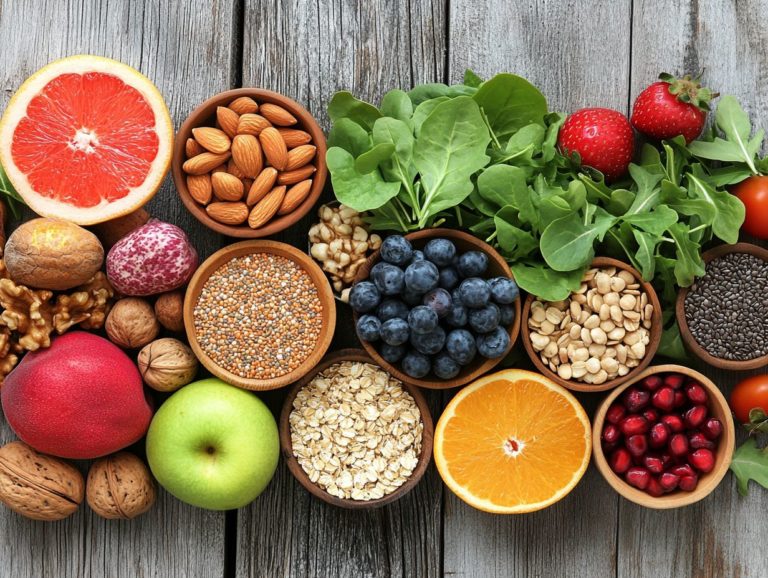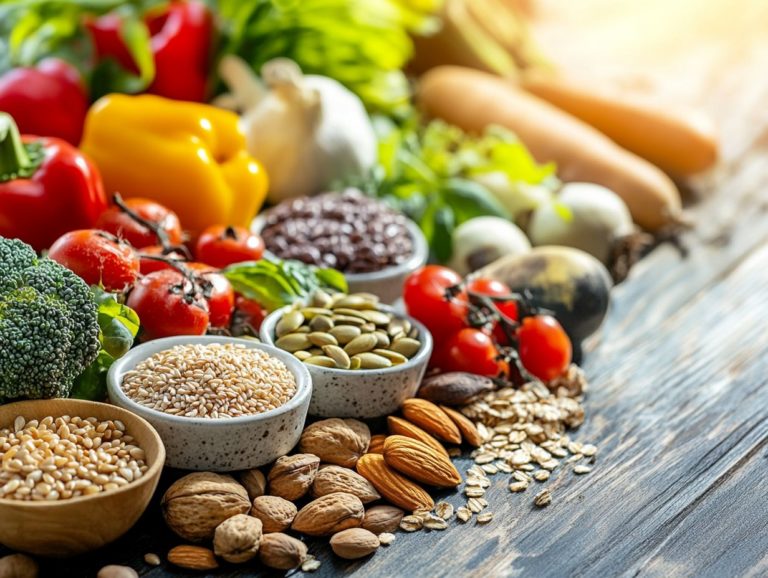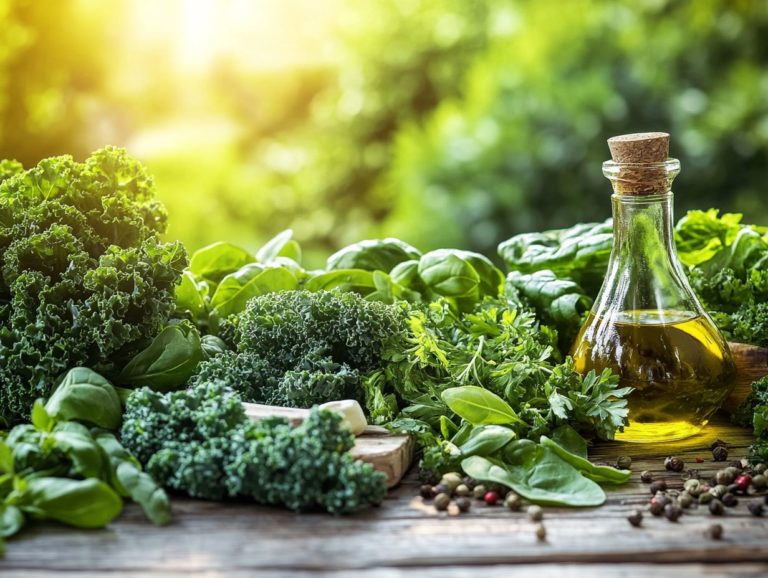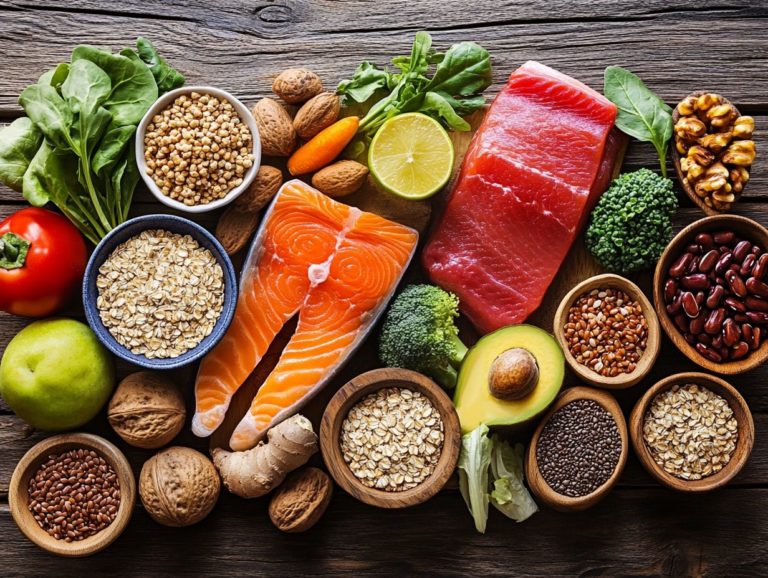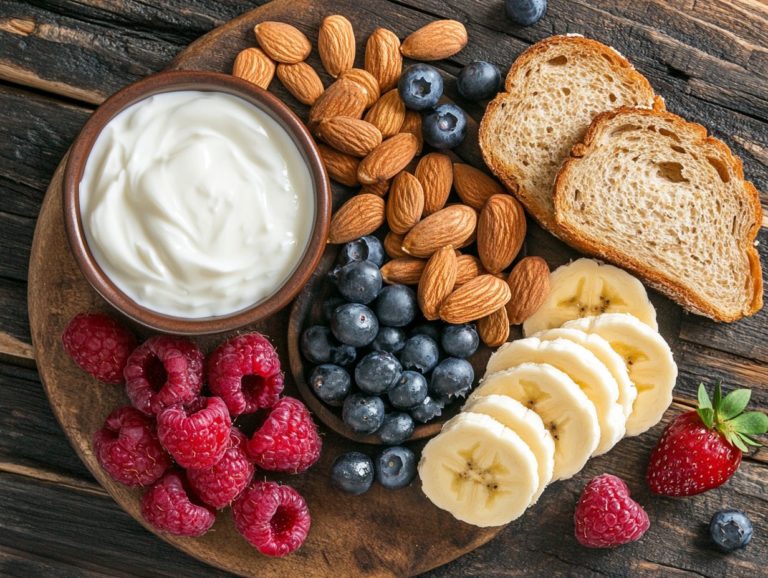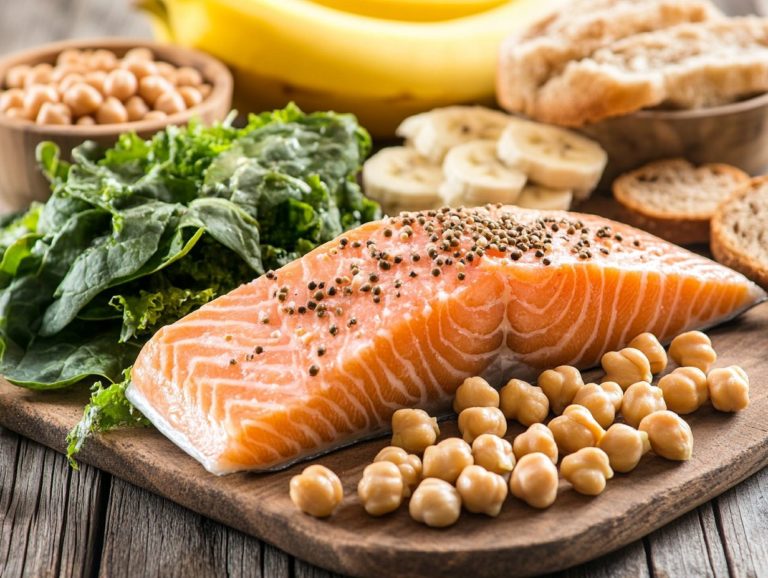Top 10 Foods Rich in Zinc for Immune Support
Zinc is essential for maintaining a robust immune system. Yet, it’s often overlooked in many diets.
From succulent oysters to wholesome lentils, certain foods are brimming with zinc. These can significantly enhance your immune defenses.
Delve into the top 10 zinc-rich foods. Discover why zinc is crucial for your health, learn how to identify a deficiency, and pick up tips for seamlessly incorporating these nutrient-dense options into your meals.
Boost your immune support today with these delicious choices!
Contents
- Key Takeaways:
- 1. Oysters
- 2. Beef
- 3. Pumpkin Seeds
- 4. Chickpeas
- 5. Cashews
- 6. Spinach
- 7. Chicken
- 8. Lentils
- 9. Quinoa
- 10. Yogurt
- What Is Zinc and Why Is It Important for Immune Support?
- How Does Zinc Help Boost the Immune System?
- What Are the Recommended Daily Intakes of Zinc?
- What Are the Signs of Zinc Deficiency?
- Can Zinc Supplements Be Used for Immune Support?
- How Can One Incorporate Zinc-Rich Foods into Their Diet?
- What Are the Other Benefits of Zinc?
- Are There Any Risks or Side Effects of Consuming Too Much Zinc?
- What Are Some Delicious Recipes Using Zinc-Rich Foods?
- Are You Getting Enough Zinc in Your Diet?
- Frequently Asked Questions
- What are the top 10 foods rich in zinc for immune support?
- How does zinc benefit the immune system?
- What is the recommended daily intake of zinc for immune support?
- Can consuming too much zinc be harmful to the immune system?
- Are there any plant-based sources of zinc for immune support?
- Can zinc supplements effectively boost the immune system?
Key Takeaways:
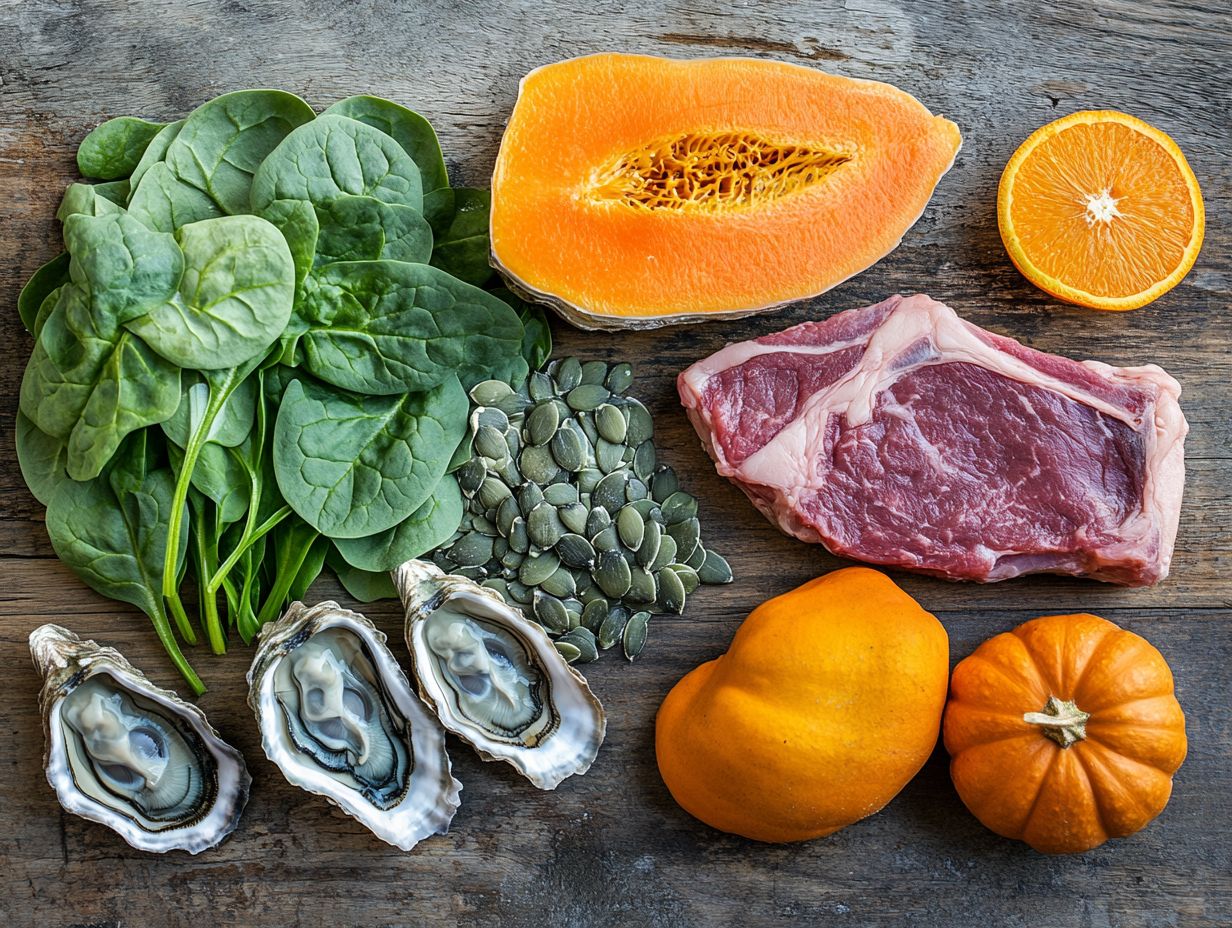
- Oysters, beef, and pumpkin seeds are top zinc sources.
- Zinc helps your body fight off sickness and keeps you healthy.
- Adults need 8-11 mg of zinc daily; pregnant women need more.
1. Oysters
Oysters are celebrated for their remarkably high zinc content. They are among the finest dietary sources of this essential mineral.
Zinc plays a pivotal role in bolstering immune function and overall health. The nutritional benefits of oysters don t stop at zinc; they also boast a wealth of other valuable nutrients, including iron, vitamin B12, and omega-3 fatty acids.
Zinc aids in wound healing and supports vital enzyme functions, which are crucial for metabolic processes and DNA synthesis.
Enjoy them raw on the half shell, toss them into seafood stews, or add them to salads. Their versatility elevates your meals while delivering health benefits that can significantly contribute to your long-term wellness.
2. Beef
Beef stands out as a rich source of zinc, offering essential nutrients that play a pivotal role in protein synthesis and immune response.
When selecting cuts, options like flank steak, ribeye, and short ribs deliver robust flavors and impressive zinc content. These cuts support various bodily functions, including digestive health since zinc helps produce digestive enzymes.
Including these flavorful cuts in your meals can help ensure your zinc levels remain adequate. This promotes a well-rounded approach to nutrition.
3. Pumpkin Seeds
Pumpkin seeds are not just a tasty snack; they re a treasure trove of zinc. They are an outstanding choice for anyone on a vegan diet looking to boost zinc intake.
These little powerhouses are loaded with antioxidants, essential for combating free radicals and reducing oxidative stress in your body.
You can effortlessly sprinkle them on salads, blend them into smoothies, or mix them into your oatmeal for that extra crunch.
Their high magnesium content also helps your muscles and keeps your blood pressure healthy. Embracing pumpkin seeds in your daily meals is a simple yet impactful way to elevate your nutritional profile.
4. Chickpeas
Chickpeas are a versatile and nutritious source of zinc. They are essential for maintaining optimal immune function while enriching your diet with plant-based goodness.
Incorporating chickpeas into your meals can significantly enhance your zinc intake, a nutrient often lacking in vegetarian diets.
Imagine enjoying a hearty chickpea salad, where these legumes harmonize with vibrant vegetables and a tangy dressing for a refreshing dish.
Alternatively, blend them into a creamy hummus for a delightful snack. This not only pleases the palate but also elevates your zinc levels when paired with whole grain pita or crisp veggies.
If you’re feeling adventurous, consider roasting chickpeas with your favorite spices. They transform into a fantastic crunchy topping for salads or soups, adding both flavor and nutrient density to your culinary creations.
5. Cashews
Cashews are a delightful snack and a substantial source of zinc, essential for supporting your immune health and reducing inflammation.
Incorporating these healthy nuts into your balanced diet can yield remarkable benefits. They provide essential fatty acids, protein, and a range of vitamins and minerals that enhance your well-being.
If you’re looking to indulge in cashews, think about adding them to:
- Stir-fries
- Salads
- Smoothies for a creamy finish
As a snack, enjoy them roasted with spices or paired with dried fruits for a perfect sweet and savory combo. It s effortless to weave this versatile food into your daily meals.
6. Spinach
Spinach is a leafy green powerhouse brimming with nutrients, including zinc. It plays a pivotal role in dietary guidelines that promote a healthy lifestyle.
This versatile vegetable offers a treasure trove of vitamins A, C, and K, along with essential minerals like iron and magnesium. By adding spinach to your diet, you can enhance your well-being with its rich antioxidant properties that help fight illness.
If you’re looking to incorporate spinach into your meals, consider these delightful options:
- Adding it to smoothies for an invigorating nutrient boost
- Tossing it into salads for a refreshing crunch
- Saut ing it with garlic for a flavorful side dish
Each of these choices boosts your daily intake of this nutritious green, making it an effortless addition to your culinary repertoire.
7. Chicken
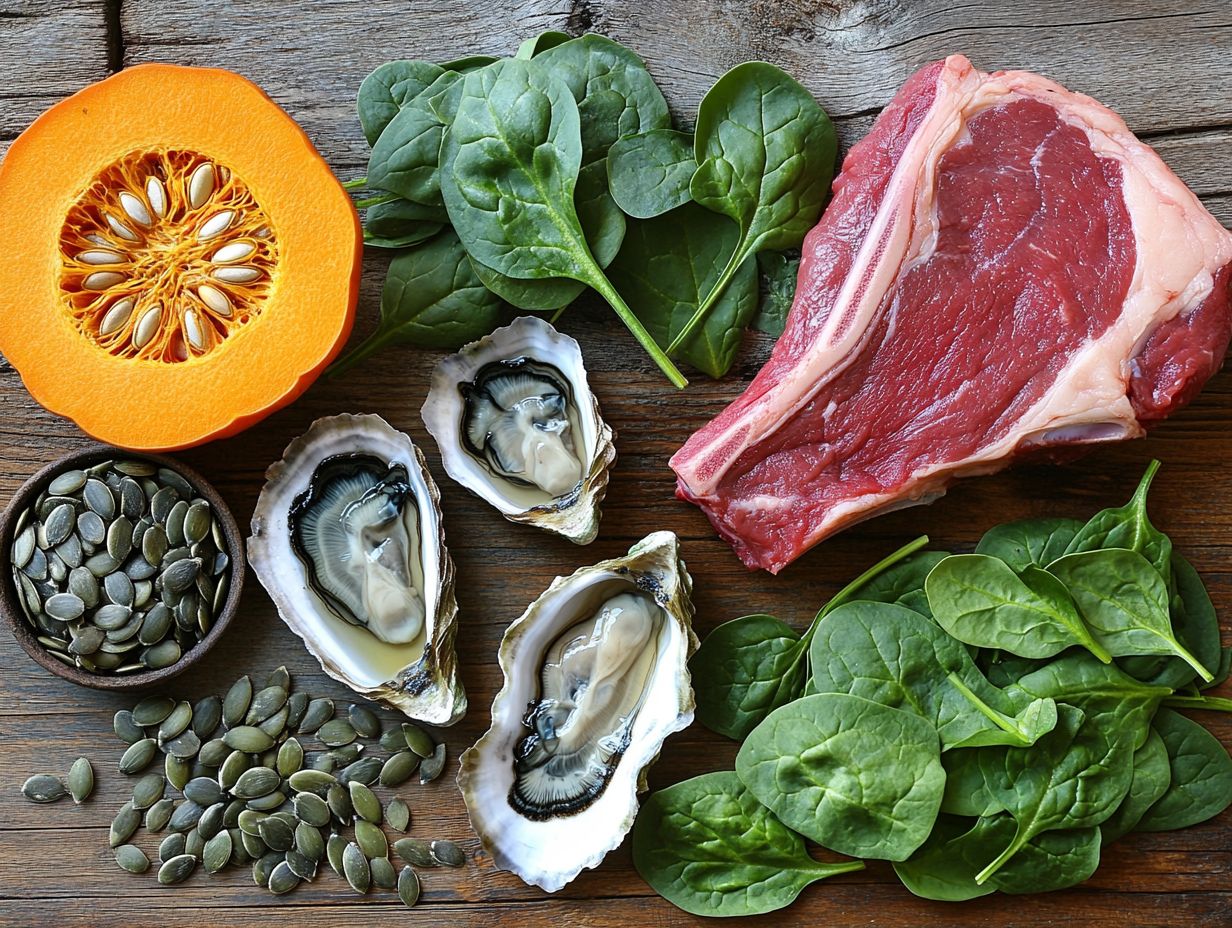
Chicken is a favored protein source and delivers a significant amount of zinc, which is essential for bolstering your immune function and facilitating protein synthesis in your body.
Use a variety of cooking methods to preserve vital nutrients in chicken. Grill or roast chicken to keep it nutritious while sealing in moisture and retaining minerals more effectively than frying.
Craft flavorful recipes by marinating chicken in citrus juices or vinegar. This not only elevates the taste but also aids in nutrient absorption.
Prepare stir-fries with colorful vegetables to enhance the dish’s nutritional profile, delivering a balanced meal rich in vitamins and minerals, all while benefiting from the chicken’s zinc content.
8. Lentils
Lentils are a prime source of zinc and an essential component of plant-based diets that meet your dietary needs for this vital mineral.
With impressive protein content, they serve as a superb meat alternative, aligning perfectly with vegetarian and vegan lifestyles.
Their unique blend of dietary fiber and nutrients supports digestive health and enhances zinc absorption, ensuring your body reaps the maximum benefits from each meal.
Don’t miss out on the benefits of lentils! Try simple techniques like simmering them in soups or stews for delightful results.
Quick and easy recipes, such as lentil salads brimming with fresh vegetables or spiced lentil curries, can effortlessly introduce variety into your diet while allowing you to enjoy the robust health benefits these legumes provide.
9. Quinoa
Quinoa is a gluten-free grain that offers not only a complete protein source but also a generous dose of zinc, making it an excellent choice for enhancing your nutrient intake and overall well-being.
Thanks to its mild flavor and fluffy texture, quinoa fits seamlessly into various dishes. Picture vibrant salads bursting with seasonal vegetables or hearty soups for comfort on chilly evenings.
Quinoa serves as a fantastic base for stir-fries, absorbing flavors while adding protein and fiber. You can even elevate your breakfast by including quinoa in bowls topped with fruits and nuts for a nourishing start to your day.
Incorporating quinoa into your meal plans enriches your dietary variety while allowing you to enjoy its myriad health benefits.
10. Yogurt
Yogurt is not just a delicious dairy product; it s a treasure trove of zinc and probiotics that enhance your skin health and support your immune function.
This powerhouse food enriches your gut microbiome the collection of bacteria in your digestive system that helps with digestion and overall health aiding digestion and promoting overall well-being.
Incorporating yogurt into your daily meals can be surprisingly effortless and delightful. You might blend it into smoothies for a creamy texture, use it as a base for zesty salad dressings, or enjoy it topped with fresh fruits and nuts for a nutritious snack.
By making yogurt a regular part of your diet, you not only tap into its rich nutrient profile but also nurture a balanced gut flora, paving the way for improved health outcomes.
What Is Zinc and Why Is It Important for Immune Support?
Zinc is an essential nutrient that plays a critical role in your immune function. A deficiency in this mineral can lead to an impaired immune response and make you more susceptible to various infections and chronic conditions.
This mineral is not just vital for immune health; it also supports a host of other bodily functions, including wound healing, DNA synthesis, and protein production. As a key player in your immune system, zinc aids in the development and activation of T-cells a type of white blood cell that helps fight infections which are crucial for defending against pathogens.
To maintain adequate zinc levels, consider incorporating dietary sources rich in this mineral, such as:
- Meat
- Shellfish
- Legumes
- Seeds
- Nuts
- Whole grains
Meeting the Dietary Reference Intakes for zinc is essential to safeguard your overall health and enhance your body’s resilience against illness.
How Does Zinc Help Boost the Immune System?
Zinc is essential for enhancing your immune system, as it boosts immune response, supports antibody production, and serves as a potent antioxidant that helps mitigate oxidative stress.
Research underscores zinc’s critical role in the maturation and function of immune cells think neutrophils and natural killer cells both of which are vital for your body s defense mechanisms.
A study published in the journal Nutrients reveals that maintaining adequate zinc levels can significantly improve your body s ability to fend off infections, ultimately reducing both the severity and duration of illness.
Zinc also regulates inflammatory responses, ensuring your immune system doesn t go into overdrive a common contributor to many chronic diseases.
Considering these pivotal functions, maintaining sufficient zinc levels is not just beneficial but crucial for your overall health and resilience against various health challenges.
What Are the Recommended Daily Intakes of Zinc?
The recommended daily intake of zinc varies based on age, gender, and life stage, with established dietary reference intakes guiding you on how to effectively meet your nutrient requirements.
For instance, if you re an adolescent boy, you typically need about 11 mg per day, while adolescent girls require around 9 mg to support their growth and development. Pregnant and lactating women have even higher needs, often requiring up to 12 mg and 13 mg respectively.
These essential levels can be achieved through a balanced diet that includes zinc-rich foods such as:
- Meat
- Shellfish
- Legumes
- Seeds
- Nuts
- Dairy products
- Whole grains
In some situations, you might consider supplements, particularly if your dietary intake isn t quite cutting it due to restrictions or health conditions. This way, you ensure you achieve adequate zinc levels, which are crucial for immune function, wound healing, and cellular metabolism.
What Are the Signs of Zinc Deficiency?
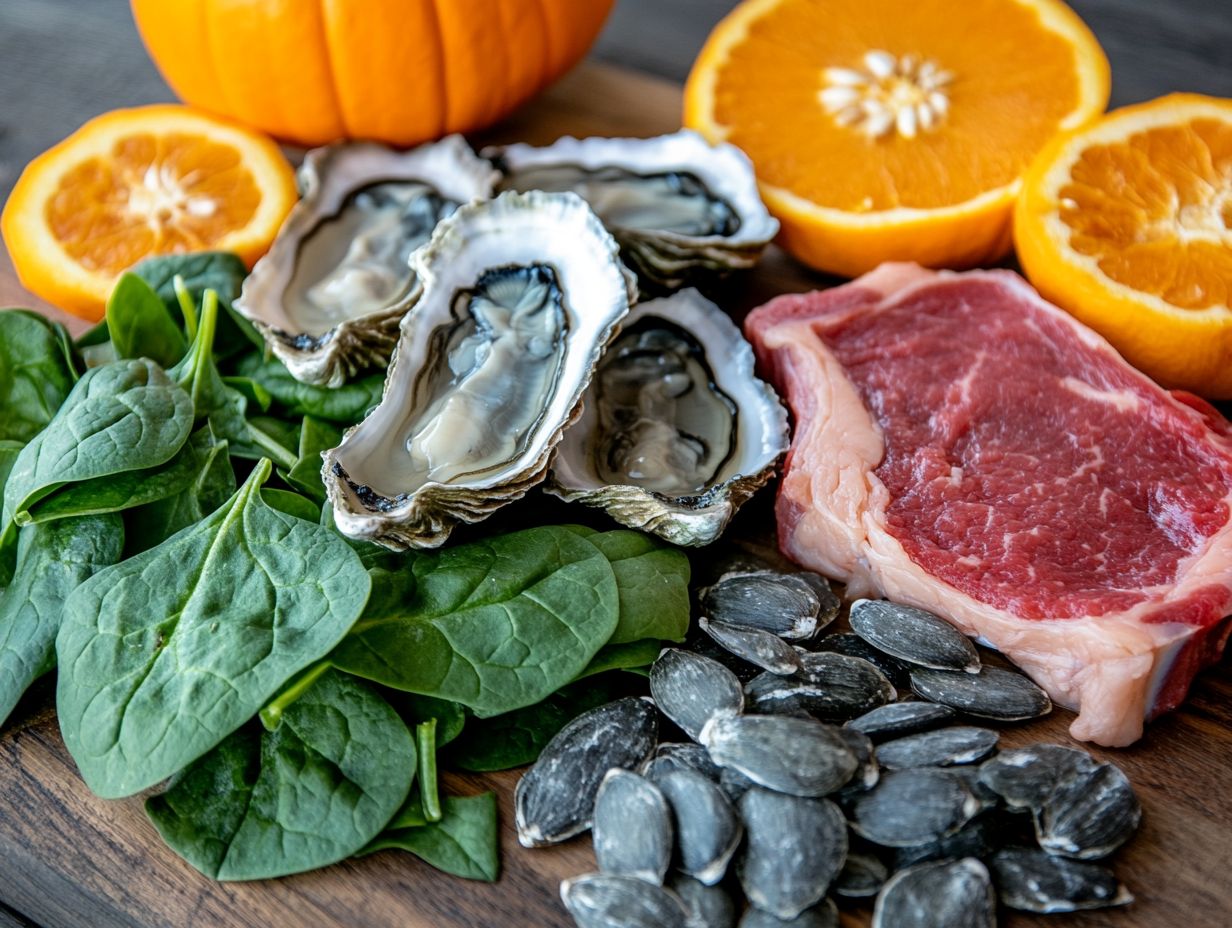
Zinc deficiency can show up in various ways, such as loss of appetite, weakened immune function, and slow wound healing, underscoring the necessity of adequate zinc intake.
You may also notice signs like hair loss, skin lesions, or an increased susceptibility to infections, all of which can significantly disrupt your daily life and productivity. If your zinc levels are low, you might find yourself more prone to illness, feeling fatigued more often, or struggling to recover from injuries.
Don t wait! Start incorporating zinc-rich foods into your meals today for better health! Enhance your meals with whole grains and dairy products to further boost your zinc levels, promoting better overall health and a more resilient immune system.
Can Zinc Supplements Be Used for Immune Support?
Zinc supplements can serve as an effective ally for your immune support, particularly during the cold season. They help to reduce both the duration and severity of cold symptoms.
You ll find a variety of zinc supplements on the market, including zinc gluconate, zinc acetate, and zinc picolinate. Each of these types has different levels of absorption, which is how much of the active ingredient is available for your body to use.
Recommended dosages typically range from 15 to 30 milligrams per day, tailored to your individual needs and specific health conditions. These supplements are particularly helpful if you frequently catch colds or have a known deficiency.
However, it s essential to exercise caution regarding excessive intake. High levels of zinc can lead to toxicity, causing symptoms like nausea, headaches, and even impaired immune function.
How Can One Incorporate Zinc-Rich Foods into Their Diet?
Incorporating zinc-rich foods into your diet is essential for maintaining optimal health. You can easily achieve this through thoughtful meal planning and adherence to dietary guidelines.
By diversifying your meals with ingredients like legumes, nuts, whole grains, and lean meats, you can effectively boost your zinc intake while keeping your meals enjoyable.
Try experimenting with recipes that feature chickpeas in salads or using quinoa as a base for stir-fries. These combinations can create delightful flavors while delivering a robust zinc benefit.
Pairing these foods with vitamin C sources, like bell peppers or citrus fruits, can enhance zinc absorption. This ensures that your body gets the full benefits of these nutritious choices.
Being mindful of portion sizes and balancing with other essential nutrients will contribute to an overall healthy dietary pattern.
What Are the Other Benefits of Zinc?
Zinc provides a multitude of health benefits that go beyond immune support. It plays a vital role in promoting skin health, enhancing bone density, and reducing the risk of age-related diseases.
Research shows that zinc is essential for the synthesis of collagen, the protein that keeps your skin elastic and youthful. Experts emphasize its remarkable ability to accelerate wound healing, making it a key ingredient in skincare treatments.
Studies reveal that adequate zinc intake can lead to improved bone mineral density, which is particularly advantageous for older adults at risk of osteoporosis. These insights highlight the importance of this trace mineral as a critical ally in your journey toward overall well-being.
Are There Any Risks or Side Effects of Consuming Too Much Zinc?
Zinc is a vital nutrient for your health, but you should be cautious. Excessive consumption can lead to zinc toxicity, causing unwelcome issues like nausea, gastrointestinal problems, and weakened immune function.
The recommended dietary allowance (RDA) for zinc varies depending on your age and gender. Generally, adult men should aim for around 11 mg per day, while adult women should target about 8 mg. If you’re considering supplementation, know that exceeding 40 mg daily may lead to undesirable side effects.
To safely integrate zinc into your diet, focus on natural food sources such as:
- Meat
- Shellfish
- Legumes
- Seeds
- Nuts
- Dairy
- Whole grains
Keep your health in check! Balance your zinc intake now to avoid the risks of over-supplementation.
What Are Some Delicious Recipes Using Zinc-Rich Foods?
Get excited about creating delicious recipes with zinc-rich foods that will boost your diet and health! These ingredients play a vital role in essential bodily functions and offer many culinary possibilities.
For example, when you incorporate chickpeas into salads or curries, you not only introduce a nutty flavor but also deliver a significant zinc boost.
Likewise, preparing succulent shrimp or oysters in a savory garlic sauce not only excites the palate but also provides a substantial nutritional benefit.
Exploring these recipes allows you to unleash your creativity in the kitchen while being mindful of your health. Ensure that every bite is both a delightful indulgence and a wise choice.
Are You Getting Enough Zinc in Your Diet?
Ensuring you get enough zinc in your diet requires a thoughtful blend of zinc-rich foods and understanding dietary guidelines. You may also consider taking vitamin or mineral pills when needed.
To effectively track your zinc intake, maintain a detailed food diary that lists the types and amounts of food you consume each day.
Incorporating foods like:
- oysters
- red meat
- poultry
- beans
- nuts
- whole grains
can significantly help you meet your daily zinc requirements. It’s essential to familiarize yourself with dietary guidelines.
The guidelines recommend a daily intake of 11 mg for men and 8 mg for women.
Talk to a healthcare provider to see if you need supplements, especially if you have dietary restrictions.
By prioritizing a well-rounded diet rich in nutrients, you support your overall health. Making specific food choices can enhance your zinc levels and promote lasting wellness.
Frequently Asked Questions
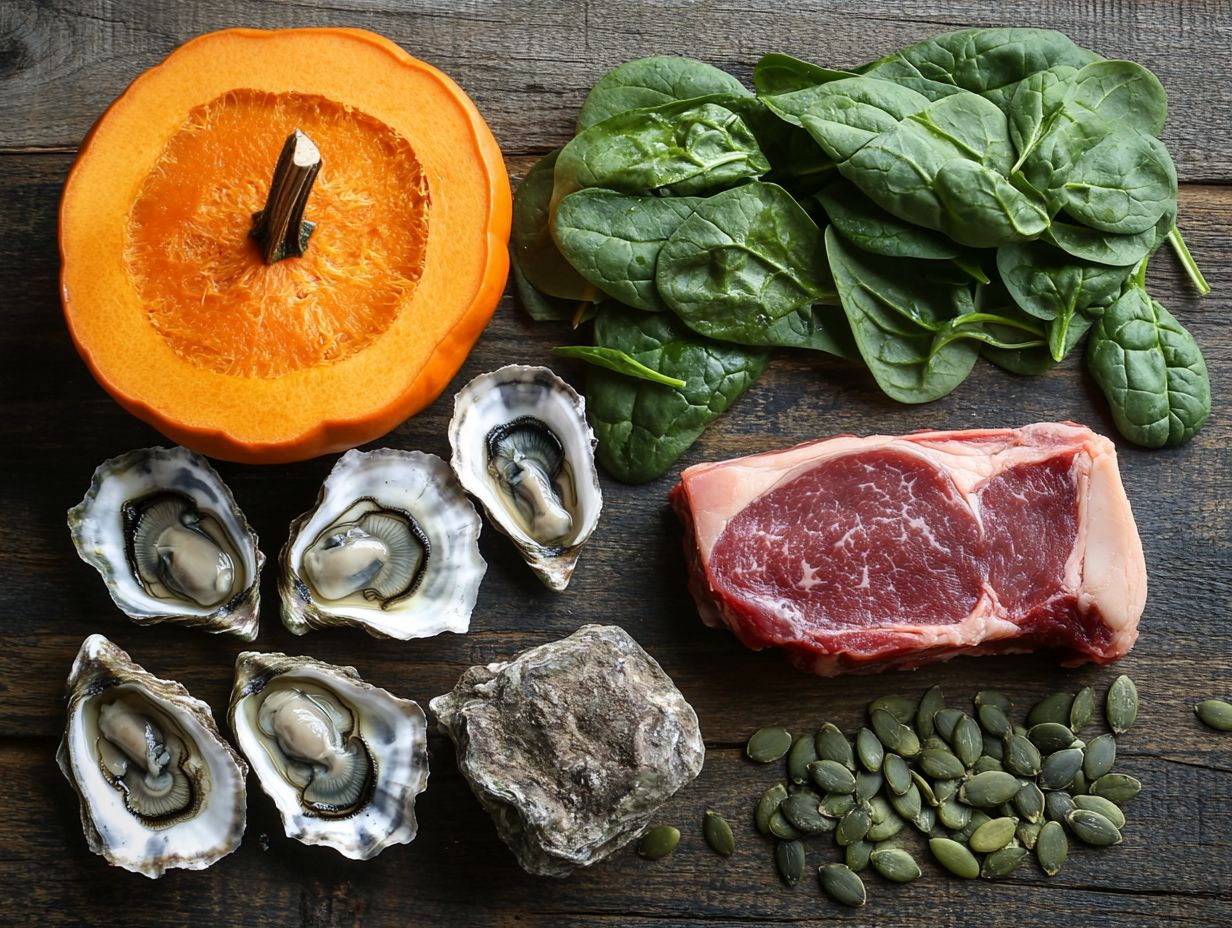
What are the top 10 foods rich in zinc for immune support?
The top 10 foods rich in zinc for immune support include oysters, beef, spinach, pumpkin seeds, lentils, chickpeas, cashews, chicken, yogurt, and mushrooms.
How does zinc benefit the immune system?
Zinc plays a crucial role in immune function by aiding in the development and function of immune cells. It also promotes the production of antibodies.
What is the recommended daily intake of zinc for immune support?
The recommended daily intake of zinc for adults is 8-11 mg for women and 11-13 mg for men. Pregnant and lactating women may need higher doses.
Can consuming too much zinc be harmful to the immune system?
Yes, consuming excessive amounts of zinc can actually weaken the immune system and cause digestive issues. It’s important to stick to the recommended daily intake.
Are there any plant-based sources of zinc for immune support?
Yes, some plant-based sources of zinc include spinach, pumpkin seeds, lentils, and chickpeas. These foods are also rich in other essential vitamins and minerals.
Can zinc supplements effectively boost the immune system?
While zinc supplements may benefit individuals with zinc deficiency, it’s always best to get nutrients from whole foods. Consult with a healthcare professional before taking any supplements.

